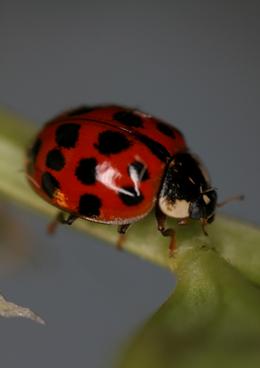Harlequin ladybird invaders
Page 1 of 1
 Harlequin ladybird invaders
Harlequin ladybird invaders
Report Harlequin ladybird invaders
30/09/2010 08:00:01
Survey to monitor impact of the harlequin
October 2010: Efforts to quantify the invasive harlequin ladybird are underway. Known as the most invasive ladybird on Earth, scientists are working hard to monitor its spread and impact - and as they gather information, you can help.

IMPOSTER: The harlequin ladybird.
Picture: Mike Majerus
This spring, Rocha UK, the environmental and nature conservation charity, teamed up with Buglife to collect sightings of the harlequin ladybird to gain a clearer picture of where they appear and how numerous they are. Buglife will use this information as part of its project to reduce the threat to native ladybirds and other species.
A Rocha Friends across the country assisted with the survey throughout the summer as the weather warmed and the ladybirds were spotted in back gardens and parks. In August a new generation of adults emerged from the pupae. During the past month these new adults will be out feeding, and as October starts, will begin to ‘overwinter' in their dormant state.
However, A Rocha is still encouraging the public to get involved in the survey. At the end of the year, records will be submitted to Buglife, who will collate the data in order to highlight the threat from harlequins to native ladybirds.
If you see any ladybirds, please make a note of:
The species if you know it - and if you haven't seen any harlequins do send information on any ladybird species you find. We have already had lots of sightings of seven-spot and two-spot ladybirds. Refer to the identification guide at: www.ladybird-survey.org/species_list.aspx.
The number of ladybirds you saw.
The location where you saw the ladybird, include your postcode if it was in your back garden or home.
And please take a photo on your camera or phone, if you can, so that we can confirm your identification.
Send records to sarah.hodgetts@arocha.org
WS
30/09/2010 08:00:01
Survey to monitor impact of the harlequin
October 2010: Efforts to quantify the invasive harlequin ladybird are underway. Known as the most invasive ladybird on Earth, scientists are working hard to monitor its spread and impact - and as they gather information, you can help.

IMPOSTER: The harlequin ladybird.
Picture: Mike Majerus
This spring, Rocha UK, the environmental and nature conservation charity, teamed up with Buglife to collect sightings of the harlequin ladybird to gain a clearer picture of where they appear and how numerous they are. Buglife will use this information as part of its project to reduce the threat to native ladybirds and other species.
A Rocha Friends across the country assisted with the survey throughout the summer as the weather warmed and the ladybirds were spotted in back gardens and parks. In August a new generation of adults emerged from the pupae. During the past month these new adults will be out feeding, and as October starts, will begin to ‘overwinter' in their dormant state.
However, A Rocha is still encouraging the public to get involved in the survey. At the end of the year, records will be submitted to Buglife, who will collate the data in order to highlight the threat from harlequins to native ladybirds.
If you see any ladybirds, please make a note of:
The species if you know it - and if you haven't seen any harlequins do send information on any ladybird species you find. We have already had lots of sightings of seven-spot and two-spot ladybirds. Refer to the identification guide at: www.ladybird-survey.org/species_list.aspx.
The number of ladybirds you saw.
The location where you saw the ladybird, include your postcode if it was in your back garden or home.
And please take a photo on your camera or phone, if you can, so that we can confirm your identification.
Send records to sarah.hodgetts@arocha.org
WS
Page 1 of 1
Permissions in this forum:
You cannot reply to topics in this forum
 Register
Register